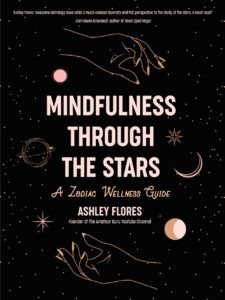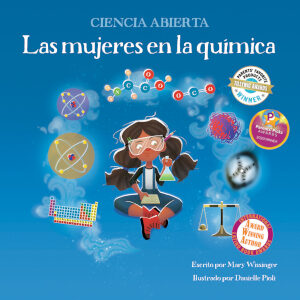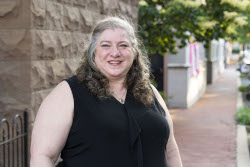Posted by Elena del Valle on October 5, 2022

Lindsay Walker, senior director of Development, Walter Cronkite School of Journalism and Mass Communication
Photo: Walter Cronkite School of Journalism and Mass Communication at Arizona State University
The Walter Cronkite School of Journalism and Mass Communication at Arizona State University pursuing its mission of “supporting communities of color, immigrants and LGBTQ+ individuals” is administering the Shaufler Prize in Journalism for its second year. According to a spokesperson who responded to questions via a public relations person via email, the contest “is open to all professional and student journalists, working at outlets of any size. We encourage entries in all formats, including video, audio, web and traditional print.”
Winners receive $20,000 in cash awards in the professional and student journalist categories. The first-place winner in the professional media category will receive $10,000. Second and third place winners will receive $3,000 and $2,000, respectively. The winner in the student category will receive a $5,000 award, according to a press release. In 2021, Paul B. Anderson, principal, of Seattle-based Workhouse Media, established the Shaufler Prize in Journalism in honor of his late friend, Ed Shaufler, who cared about promoting the understanding of underrepresented people, according to a press release.
“The Shaufler Prize, now in its second year, recognizes the best journalism in the country that advances the understanding of issues related to underserved people in society,” said Lindsay Walker, senior director of Development, Walter Cronkite School of Journalism and Mass Communication, when asked about the goal of the contest. “This prize seeks to recognize journalism that offers in-depth coverage of the issues affecting communities of color, immigrants and the LGBTQ+ population; tell stories that capture human experiences and build understanding among diverse people and communities; and explore and illuminate key public policy, legal, social, cultural or political issues regarding the treatment of marginalized communities and individuals.”
When asked how the organizers define “color” and underrepresented communities for purposes of submissions, she replied, “While we provide examples of such communities, we seek to allow journalists and their stories to illuminate the subjects and issues they are covering. In other words, the work can speak for itself, and we seek to be more inclusive — not less.”
The selection criteria? She said, “Judges evaluate the work based on four criteria: reporting quality, reporting depth, storytelling/narrative and impact potential.”
When asked how, if at all, the organizers distinguish between individual journalists and those working for large organizations and corporations she replied, “At this time, the contest does not make that distinction. Our aim is to let the work speak for itself.” When asked for the names, titles and affiliations of the judges who determine the winners and their photos she replied, “The judging panel for the 2022 contest is still being formed. The finalist judges in the professional category for 2021 included: Sharif Durhams Managing Editor of Raleigh News and Observer and Charlotte, Observer. (now with the Washington Post); Lee Edwards, digital based journalist with the Real Chi experimental newsroom in Chicago; Nora Lopez, managing editor of San Antonio Express, president of National Association of Hispanic Journalists in the country. She became a U.S citizen in 2008; and Asha Saluja, formerly audio producer and manager of Slate podcasts; former host on Radio Free Brooklyn.”
According to the press release, in its inaugural year, the 2021 first place prize was awarded to Toluse Olorunnipa and Griff Witte, and the staff of The Washington Post, for their story, Born with Two Strikes: How systemic racism shaped Floyd’s life and hobbled his ambition, part of the series, George Floyd’s America. Lizzie Presser of ProPublica took second place with Tethered to the Machine about JaMarcus Crews, who tried to get a new kidney. Maria Perez of the Milwaukee Journal Sentinel received third place for The Long Way Home about migrant workers at a Wisconsin green bean plant dying of COVID-19. In the student category, the Cronkite School’s Howard Center for Investigative Journalism took the top prize for Little Victims Everywhere, a series examining child sexual abuse in Indian Country.
Posted by Elena del Valle on September 28, 2022

The Cottage Fairy Companion
Photos: Yellow Pear Press
Artist Paola Merrill reads children’s books and posts video snippets of her life in a cottage in rural Washington State as The Cottage Fairy on YouTube.com. As of this writing a little over one million people follow her updates. In The Cottage Fairy Companion A Cottagecore Guide to Slow Living, Connecting to Nature, and Becoming Enchanted Again (Yellow Pear Press, $22.99), her first book, she shares her “meditations and practices.” From idea to completion the project required one year.
When asked about herself by email via her publisher she replied, “I spend my days painting in my cottage, taking long walks with my husband and dog, reading children’s books, and drinking lots of tea while curled up with my kitty! My goal is to make my art and work as earth conscious as possible, and to spread joy and wonder through all my media. In the same way that nature and stories inspire me, I want to encourage creativity and peace in others to share the light and beauty of this world.”
She wrote the book for “Anyone looking to slow down for some moments of peaceful reflection!” The 166-page softcover book published this year features her art in watercolor and ink pens. It is divided into four main sections by season: Spring, Summer, Autumn and Winter.

Paola Merrill, author, The Cottage Fairy Companion
When asked what she hopes to achieve by writing about living in a cottage she said, “To give readers a moment to slow down and reflect on the beauty of life around them. And maybe inspire them to simplify life and prioritize what brings them fulfillment and joy.”
How will she measure success in relation to the book? She said, “I am not actually trying to measure success. It has been a dream of mine to publish a book for a long time, so just getting it out is already a success to me!”
She relies on the publishing company for book promotion and makes announcements across her social medias channels. Fairy in the title refers to the name of her YouTube handle, “and references the magic and whimsy that inspired me to start my channel and creative journey.”
When asked what she means when she says mindful while gardening, baking, and other tasks in the book, she said “To be fully aware of the present moment, and reflect on the joys of simple living and activities as you take part in them. This is countercultural to the fast-paced hectic bustle of most daily routines our society promotes.”
Comments:
Filed Under: Books
Posted by Elena del Valle on September 14, 2022

Mindfulness Through the Stars
Photo: Mango Publishing Group
Ashley Flores, who as of this writing has 172,000 subscribers on YouTube, where she posts content as the Amateur Guru, wrote Mindfulness Through the Stars A Zodiac Wellness Guide (Mango Publishing Group, $22.95). The 175-page hardcover book has a 2020 copyright.
The book, her first, is divided into an Introduction, a chapter for each sign of the zodiac as well as a chapter on mindfulness and one on self care. According to her biography the Canadian resident is an amateur astrologist.
When asked about the primary target audience for the book the author replied via email through a Mango representative, “While writing this book, I tried not to have a specific target audience in mind. Of course, I knew a large portion of the people choosing to purchase and read my book would be viewers of my youtube channel. These viewers are typically young adults, of all genders. However, I targeted my book towards people who value personal-development, mindfulness, self-care, and of course astrology lovers! I wanted to cater this book to people who have a basic understanding of zodiac signs, so that they could learn the potential that tuning into their zodiac signs energy can have on aiding them on their self-help journey!”
Regarding the amount of time the project required from idea to publication she said, “Prior to beginning the writing process, I worked closely with Mango to develop an editorial brief, come up with a name, a cover, and of course – a general idea of what the book could be. This process took a few months. I began writing the book in October 2019 and the final draft was submitted early May 2020. It was a much quicker process than I had imagined!”
When asked if she has plans for other titles she said, “Absolutely! I am planning to release a guided journal, as well as a second self-help book. I am also currently working on guided workbooks and worksheets.”
When asked her motivation in writing the book she said, “As a child and young adult, I had always had a passion for writing. I often wrote short stories, poetry, and scripts. It was always a goal of mine to release a book. Eventually, I channeled all of my creative energy into my youtube channel which gained the attention of Mango Publishing. They saw something in me, and presented the idea to me to write a book on Astrology. It all felt very aligned with my passions, and I happily decided to work with them on this book!”
“As a creative person, I have many goals and aspirations,” she said when asked what she hopes to achieve. “A few things I would love to achieve are writing a second book, becoming a life coach, success on both of my youtube channels, and using my platform and endeavours to help change the lives of others around me. I have a passion for helping others understand themselves and their true passions, and would love to see how far I can take that.”
How will she measure success in relation to the book? “If just one person can read my book and say it helped change their life for the better…That is success to me.”
Regarding ways and channels other than her own YouTube videos she uses to promote the book she said, “I promote my book mostly through my TikTok and Instagram, however – I bring it up in real life conversations as often as I can! I live in a big city and meet a lot of people, and always go out of my way to bring up my book as often as possible! People are very supportive and either purchase the book, or recommend it to a friend.”
When asked about the title and the chapter on self care she said, “To me, being mindful is to be intentional and aware. These are forms of self-care to me. Being intentional allows me to make sure that all of my actions are in alignment with who I am and what I want. When I take the time to be intentional, I find that I am able to tune into my higher self with ease. This is important to me because I strive to be the best version of myself daily. When I show up for myself, and others – I want to make sure I am reaching, or close to – my highest potential.”
Comments:
Filed Under: Books
Posted by Elena del Valle on August 31, 2022

On October 4, 2022 MhzChoice.com plans to offer its first Japanese series, according to a recent press release. Pension Metsa, a six-episode miniseries released in 2021, features Tenko, a Japanese woman who runs a one room country guesthouse in the Nagano larch forest. Nagano is 278 kilometers northwest of Tokyo. MhzChoice.com provided a screener although no images or video clips were available for editorial publication.
A different brief story unfolds around a guest star in each 20-minute episode. The stories take place in and around the pretty guesthouse and its natural environs. Often there are shared meals and soulful conversations.
Satomi Kobayashi is Tenko. According to Imdb.com Kana Matsumoto is the writer and director of the series. The episodes are in Japanese. English subtitles were added by the streaming service.
Actress Tôko Miura, who played the young chauffeur Misaki in the Oscar-winning feature Drive My Car, appears in Episode 6. MhzChoice.com offers a streaming subscription service of European series and programs with English subtitles.
Posted by Elena del Valle on August 10, 2022


Las mujeres en la química and Las mujeres en la física
Photos: Science, Naturally!
Targeting children aged seven to ten with English and Spanish language 37-page and 39-page titles about the sciences Science, Naturally! released Las Mujeres en la química and Las mujeres en la física by Mary Wissinger last year. Danielle Pioli illustrated the titles. The books are translations of Women in Chemistry and Women in Physics originally published by Genius Games LLC in 2016.

Women in Chemistry
Michelle A. Ramirez and The Spanish Group were responsible for translating both titles. Lidia Diaz, Ph.D., and Camilla Hallman are listed as Spanish-language consultants for Las mujeres en la física. Spanish-Milka O. Montes, Ph.D., and Hallman are listed as Spanish-language consultants for the second Spanish language book. All titles have a $12.95 cover price.

Dia L. Michels, publisher, Science, Naturally!
“We have promoted these books across all of our social media platforms and to our newsletter subscribers,” said Dia L. Michels, publisher, Science, Naturally! via email when asked in what ways and via what channels her company has promoted the titles. “We also reached out to educators, librarians, and STEM programs. And, of course, to the reviewers and customers who already love our other Spanish-language books! They are always excited to hear about new ways to share STEM content with children. We submitted Las mujeres en la química for Empowering Latino Future’s International Latino Book Awards, under the translation category, and it earned an award. We take pride in the amount of effort we put into each of our books to ensure that the translation captures both the content and the feeling of the English editions, so the fact that we can promote these titles by pointing to a translation award is a huge achievement! Empowering Latino Futures also does a bit of promotion for their award-winning authors to help make quality Spanish-language resources easier to find.”

Mary Wissinger, author, Women in Chemistry and Women in Physics
Wissinger was born and grew up in Wisconsin where she dove into storytelling through acting, singing, and writing. A former teacher, according to her biography she can be found at her standing desk in St. Louis, Missouri, “writing stories to inspire curiosity about the world and connection with others.” She is the author of the Science Wide Open Series and the My First Science Textbook Series.

Danielle Pioli, illustrator, Women in Chemistry and Women in Physics
Artist and illustrator Pioli, drawn to magic (what she calls quantum physics now), is on a mission to inspire others to create. According to her biography, “The idea of creating a whole universe from her mind to paper is what made her fall in love with art and storytelling.” She creates art, illustrations, comics, zines, poems, songs, and hypnotherapy sessions. She is the illustrator of the Science Wide Open Series.

Women in Physics
Three new books in the Science Wide Open series are due out in September 2022: Women in Engineering, Women in Medicine, and Women in Botany. Spanish versions titled Las mujeres en la ingeniería, Las mujeres en la medicina, and Las mujeres en la botánica are expected early next year, according to Michels.
Comments:
Filed Under: Books




















